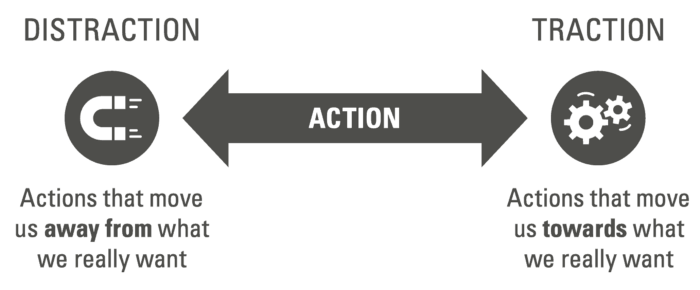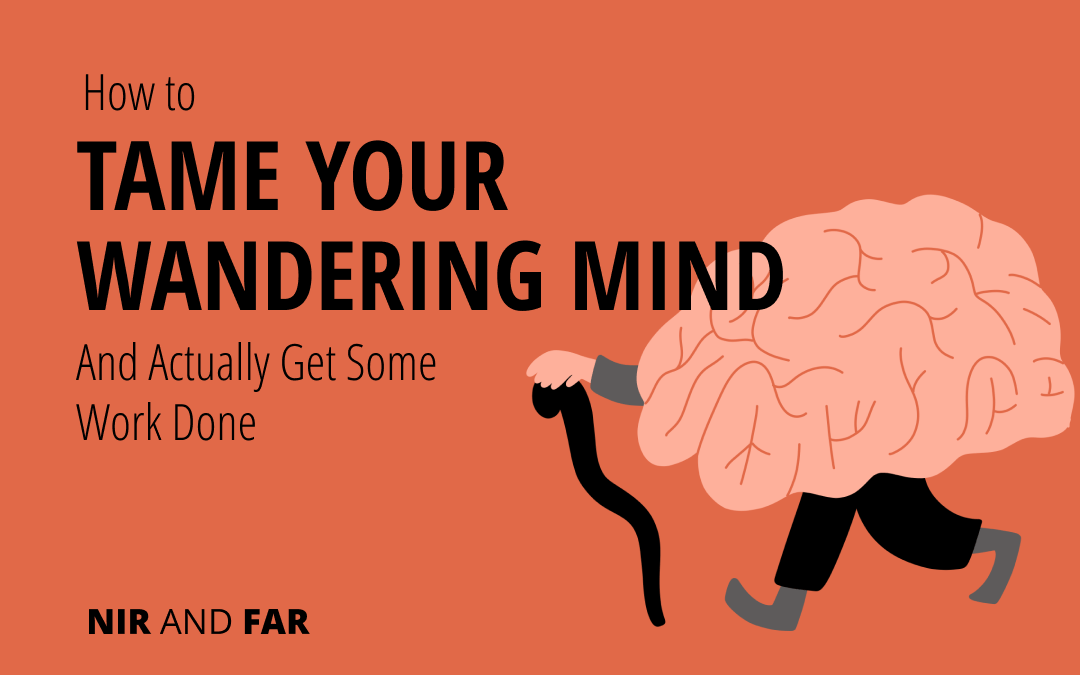You have a big deadline looming, and it’s time to hunker down. But every time you start working, you find that, for some reason, your mind drifts off before you can get any real work done. What gives? What is this cruel trick our brains play on us, and what do we do about it?
Thankfully, by understanding why our mind wanders and taking steps to deal with distraction, we can stay on track. But first, let’s understand the root of the problem.
Why do our minds wander?
Unintentional mind wandering occurs when our thoughts are not tied to the task at hand. Researchers believe our minds wander when the thing we’re supposed to be doing is not sufficiently rewarding, so our brains look for something more interesting to think about.
We’ve all experienced it from time to time, but it’s important to note that some people struggle with chronic mind-wandering: Though studies estimate ADHD afflicts less than 3 percent of the global adult population, it can be a serious problem and may require medical intervention.
For the vast majority of people, mind wandering is something we can tame on our own — that is, if we know what to do about it. In fact, according to Professor Ethan Kross, director of the Emotion & Self Control Laboratory at the University of Michigan and author of Chatter: The Voice in Our Head, Why It Matters, and How to Harness It, mind wandering is perfectly normal.
“We spend between a third to a half of our waking hours not focused on the present,” he told me in an email. “Some neuroscience research refers to our tendency to mind-wander as our ‘default state.’”
So why do we do it?
“Mind wandering serves several valuable functions. It helps us simulate and plan for the future and learn from our past, and it facilitates creative problem-solving,” Kross explained. “Mind wandering often gets a bad rep, but it’s a psychological process that evolved to provide us with a competitive advantage. Imagine not being able to plan for the future or learn from your past mistakes.”
Is mind wandering bad for you?
“Like any psychological tool, however, mind wandering can be harmful if used in the wrong context (i.e., when you’re trying to focus on a task) or inappropriately (i.e., when you worry or ruminate too much),” according to Kross. In other words, mind wandering is a problem when it becomes a distraction. A distraction is any action that pulls you away from what you planned to do.
If, for instance, you intended to work on a big project, such as writing a blog post or finishing a proposal, but instead find yourself doing something else, you’re distracted.

Free Schedule Maker Template
Take back control of your time and design your ideal day.
Your email address is safe. I don't do the spam thing. Unsubscribe anytime. Privacy Policy.

1) Make time for mind wandering.
Mind wandering isn’t always a distraction. If we plan for it, we can turn mind wandering into traction. Unlike a distraction, which by definition is a bad thing, a diversion is simply a refocusing of attention and isn’t always harmful.
There’s nothing wrong with deciding to refocus your attention for a while. In fact, we often enjoy all kinds of diversions and pay for the privilege.
A movie or a good book, for instance, diverts our attention away from real life for a while so we can get into the story and escape reality for a bit.
Similarly, if you make time to allow your mind to drift and explore whatever it likes, that’s a healthy diversion, not a distraction.
The first step to mastering mind wandering is to plan time for it. Use a schedule maker and block off time in your day to let your thoughts flow freely. You’ll likely find that a few minutes spent in contemplation can help you work through unresolved issues and lead to breakthroughs. Scheduling mind wandering also lets you relax because you know you have time to think about whatever is on your mind instead of believing you need to act on every passing thought.
It’s helpful to know that time to think is on your calendar so you don’t have to interrupt your mind-wandering process or risk getting distracted later.
2) Catch the action
One of the difficulties surrounding mind wandering is that by the time you notice you’re doing it, you’ve already done it. It’s an unconscious process so you can’t prevent it from happening.
The good news is that while you can’t stop your mind from wandering, you can control what you do when it happens.
Many people never learn that they are not their thoughts. They believe the voice in their head is somehow a special part of them, like their soul speaking out their inner desires and true self. When random thoughts cross their mind, they think those thoughts must be speaking some important truth.
Not true! That voice in your head is not your soul talking, nor do you have to believe everything you think!
When we assign undue importance to the chatter in our heads, we risk listening to half-baked ideas, feeling shame for intrusive thoughts, or acting impulsively against our best interests.
A much healthier way to view mind wandering is as brain static. Just as the random radio frequencies you tune through don’t reveal the inner desires of your car’s soul, the thoughts you have while mind-wandering don’t mean much — unless, that is, you act upon them.
Though it can throw us off track, mind wandering generally only lasts a few seconds, maybe minutes. However, when we let mind wandering turn into other distractions, such as social-media scrolling, television-channel surfing, or news-headline checking, that’s when we risk wasting hours rather than mere minutes.
If you do find yourself mentally drifting off in the middle of a task, the important thing is to not allow that to become an unintended action, and therefore a distraction.
An intrusive thought is not your fault. It can’t be controlled. What matters is how you respond to it — hence the word respon-sibility.
Do you let the thought go and stay on task? Or do you allow yourself to escape what you’re doing by letting it lead you toward an action you’ll later regret?
3) Note and refocus
Can we keep the helpful aspects of mind wandering while doing away with the bad? For the most part, yes, we can!
According to Kross, “Mind wandering can easily shift into dysfunctional worry and rumination. When that happens, the options are to refocus on the present or to implement tools that help people mind-wander more effectively.”
One of the best ways to harness the power of mind wandering while doing an important task is to quickly note the thought you don’t want to lose on a piece of paper. It’s a simple tactic anyone can use but few bother to do. Note that I didn’t recommend an app or sending yourself an email. Tech tools are full of external triggers that can tempt us to just check “one quick thing,” and before we know it, we’re distracted.
Rather, a pen and Post-It note or a notepad are the ideal tools to get ideas out of your head without the temptations that may lead you away from what you planned to do.
Then, you can collect your thoughts and check back on them later during the time you’ve planned in your day to chew on your ideas. If you give your thoughts a little time, you’ll often find that those super important ideas aren’t so important after all.
If you had acted on them at the moment, they would have wasted your time. But by writing them down and revisiting them when you’ve planned to do so, they have time to marinate and may become less relevant.
However, once in a while, an idea you collected will turn out to be a gem. With the time you planned to chew on the thought, you may discover that mind wandering spurred you to a great insight you can explore later.
By following the three steps above, you’ll be able to master mind-wandering rather than letting it become your master.
Related Articles
- Schedule Maker: a Google Sheet to Plan Your Week
- Habit Tracker Template in Google Sheets
- The Ultimate Core Values List: Your Guide to Personal Growth
- Timeboxing: Why It Works and How to Get Started in 2025
- An Illustrated Guide to the 4 Types of Liars
- Hyperbolic Discounting: Why You Make Terrible Life Choices
- Happiness Hack: This One Ritual Made Me Much Happier

